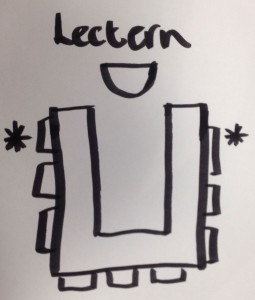The then present
Kneeling on the back seat of the taxi, I looked at the diminishing form of my grandmother, weeping on the hot concrete pavement. She was staying behind. Not coming with us.
Framed by the rectangular back window of the taxi, I watched my grandmother becoming smaller and smaller. She disappeared as the taxi rounded the corner and it was then that her memory started to become bigger and bigger in my heart. That’s all I had left of her. She became larger than life – the one whose cool touch would no longer soothe my fevered brow, whose reassuring voice would no longer tell me real bedtime stories from her life, who would no longer teach me to sew or crochet, and who would never again pick me up when I fell on the concrete pavement in front of our house.
The rest of that day was a blur, me a bit player, following and doing what I was told. Arriving at the airport, I remember white gloved security officials searching through our bags before allowing us to pass through to the boarding area. I remembering feeling afraid of not being allowed to pass through, of not being able to join my Dad waiting for us in a strange land, of being left behind. We were on our way to a new country, a new home, a new language, new friends, new everything.
Plucked from everything familiar, I knew anxiety and fear for the first time in my life. I spent the entire flight being sick. Arriving on the other side, my Dad was the first face I saw when we came out the sliding doors to the waiting area. He’d positioned himself right at the front, and I remember his gentle relieved smile full of love as he saw us for the first time in many weeks.
The then past
I should have suspected something was afoot when my grandmother had asked me, a few weeks before, how I would feel about moving to a new country.
“I don’t want to go” I remember saying, “English has a different alphabet, how am I going to learn?”
I don’t remember much more about that conversation. I don’t remember the process of packing in my house. I don’t remember saying goodbye to my neighbours and friends. I don’t remember saying goodbye to my nanny since birth, Eliza, or our cook, Armando, who used to make special dishes for me, lightly spiced, so that I would gradually get used to eating hot food. I don’t even remember saying goodbye to my uncle and my aunt and my great-grandmother. All I remember is my grandmother making new dresses, for me and my sister, in her little sewing room under the stairs. The room I loved to hide in, escape from homework, to spend time watching her making beautiful clothes.
The then future
Even though I was with my Mom, Dad, sister and brother in the new country, I later came to realise that overriding the fear and anxiety on that day, the 25th October 1974, was a sense of abandonment. Even though I had moved forward to a new life, I had left a part of me behind, in the land of my birth. I had left a part of me behind in that house in front of the hospital, in the little sewing room under the stairs, on the concrete pavements where I had played hopscotch and skipped with my friends. The large extended and close-knit family of my initial years was gone, involuntarily split forever on that day.
To my 9 year old mind that was as bad as it got. Trying to make sense of that single defining moment, for decades I marked the day in my mind – it became a count-up to the number of years spent in my adopted country and the number of years apart from my grandmother. I stopped counting in the year that she died – 2008.
The now future
The story narrated above was not unique. It played out in many families at the time in the land of my birth. It is still being played out, as you’re reading this, in countries and families too many to count without feeling a sense of desolation.And as I often relive the memories of my Grandmother and of the country of my birth, I am reminded of something Marcel Proust, author of the French novel “À la recherche du temps perdu” (“In Search of Lost Time“) said:
In the midst of winter I finally learned that there was in me an invincible summer! - Marcel Proust


